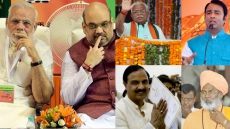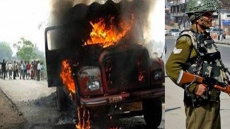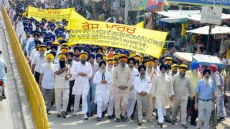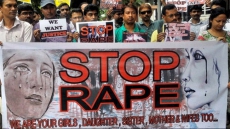New Delhi: After writers and artistes, 53 historians on Thursday protested against the 'rising intolerance' and "highly vitiated atmosphere in the country, characterised by various forms of intolerance".
The historians came out strongly against Prime Minister Narendra Modi for not issuing any statement on the rising intolerance in the country.
These historians include Romila Thapar, Irfan Habib, D.N. Jha, Neeladri Bhattacharya, Amar Farooqui, Mridula Mukherjee, Nayanjot Lahiri and Delhi University professor Upinder Singh, a daughter of former prime minister Manmohan Singh.
"At the launch of a book - whose author happens to be from a country disapproved of by certain groups - the organiser is disfigured with ink thrown on his face. And when it is hoped that the head of government will make a statement about improving the prevailing conditions, he chooses to speak only about general poverty; and it takes the head of the state to make the required reassuring statement, not once but twice," the statement said.
The statement released by the Safdar Hashmi Memorial Trust (SAHMAT) referred to the Dadri lynching of Mohammed Akhlaq and the ink attack on Sudheendra Kulkarni, chairman of the Observer Research Foundation, before the launch of former Pakistan foreign affairs minister Khurshid Mahmud Kasuri's book.
It also referred to the "delayed and sparse response" from the prime minister after these incidents and President Pranab Mukherjee's intervention in the form of an exhortation to maintain the social fabric of the country.
"Nobody can be apolitical in this situation, looking at what's happening. And it's a very sober statement," said Nayanjot Lahiri, professor of history at Delhi University.
Referring to the dismissal of earlier protests by writers, artistes and more recently scientists, Lahiri said protest was part of democracy and it was not right for everybody to keep quiet even as "powers that be behaved as if it is business as usual".
"Why does everything great in India has to be seen as part of Vedic tradition? There are many great things in ancient India outside of it. It's a beautiful untidy story. We identify with the Harappan civilisation, but don't like to admit that they liked to eat cattle or that same sex love in ancient India was imaged in terracotta sculptures. If it was all a single act of creation, why bother studying history? It's all very Biblical, if we come to think of it," Lahiri told IANS.
DU professor Upinder Singh told IANS that mere government reaction was not enough but signals from other sections of society were also needed.
"It is not just the government which needs to come forward; a response from many other quarters is also needed. Writers, artistes and scientists are voicing their opinion now. So those whose job is to ensure law and order should take cognizance of these reactions," she told IANS.
Commenting on the statement issued by the historians, Upinder Singh said, "It is a cumulative reaction. This movement of writers, artistes and historians coming forward and issuing statement is spontaneous. A combination of incidents has made people worried. The intolerance towards rationalists, neighbouring countries and extreme violence by those who object to different opinions is scary."
"We cannot function if the atmosphere is such where others' creativity is not respected," she added.
Jawaharlal Nehru University professor R. Mahalakshmi, a signatory to the statement, said, "People in the name of religion and tradition are taking law into their own hands. It is very important for us (historians) to fight against such practice because India has a rich and diverse culture and the 'rashtrawadis' are using the colonial past to impose their own ideologies."
"When writer after writer is returning awards of recognition in protest, no comment is made about the conditions that caused the protest; instead the ministers call it a paper revolution and advise the writers to stop writing. This is as good as saying that intellectuals will be silenced if they protest," the statement read.





